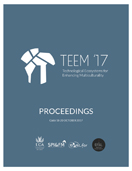Cited By
View all- Zhang GZhu ZZhu SLiang RSun G(2022)Towards a better understanding of the role of visualization in online learning: A reviewVisual Informatics10.1016/j.visinf.2022.09.0026:4(22-33)Online publication date: Dec-2022
- García-Molina SAlario-Hoyos CMoreno-Marcos PMuñoz-Merino PEstévez-Ayres IDelgado Kloos C(2020)An Algorithm and a Tool for the Automatic Grading of MOOC Learners from Their Contributions in the Discussion ForumApplied Sciences10.3390/app1101009511:1(95)Online publication date: 24-Dec-2020
- Moreno-Marcos PAlario-Hoyos CMunoz-Merino PKloos C(2019)Prediction in MOOCs: A Review and Future Research DirectionsIEEE Transactions on Learning Technologies10.1109/TLT.2018.285680812:3(384-401)Online publication date: 1-Jul-2019

